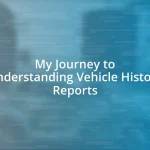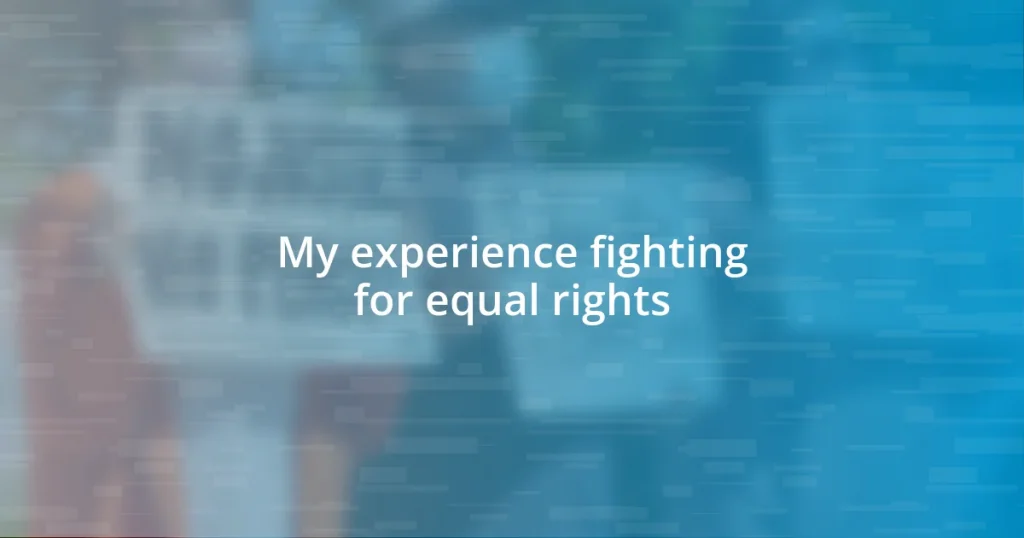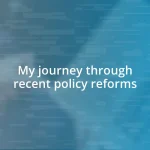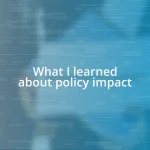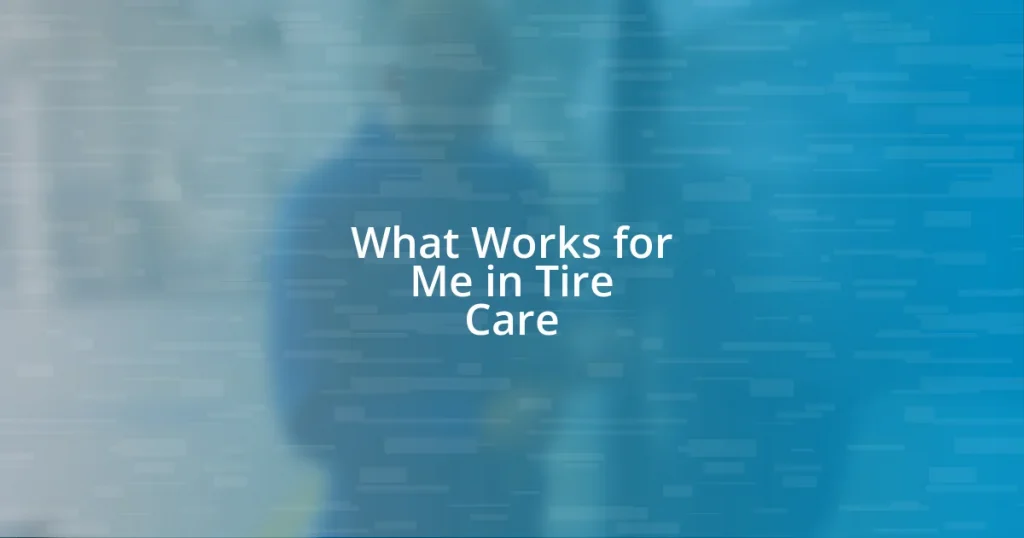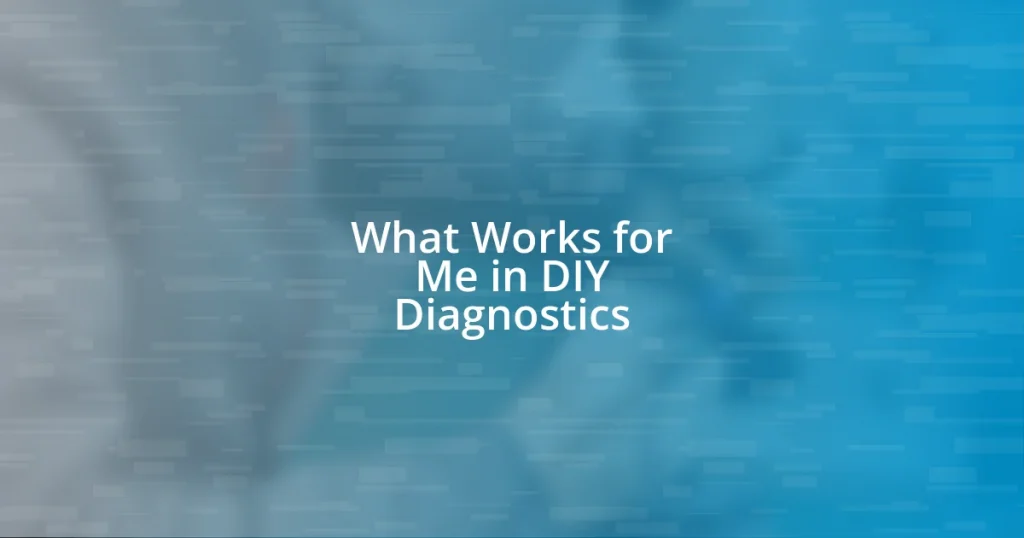Key takeaways:
- Witnessing discrimination firsthand during community meetings sparked a personal commitment to advocate for equal rights.
- Effective activism involves unity among allies, overcoming internal conflicts, and maintaining persistence in the face of challenges.
- Education, engagement with policymakers, and fostering intergenerational connections are essential for continued progress in the fight for equality.
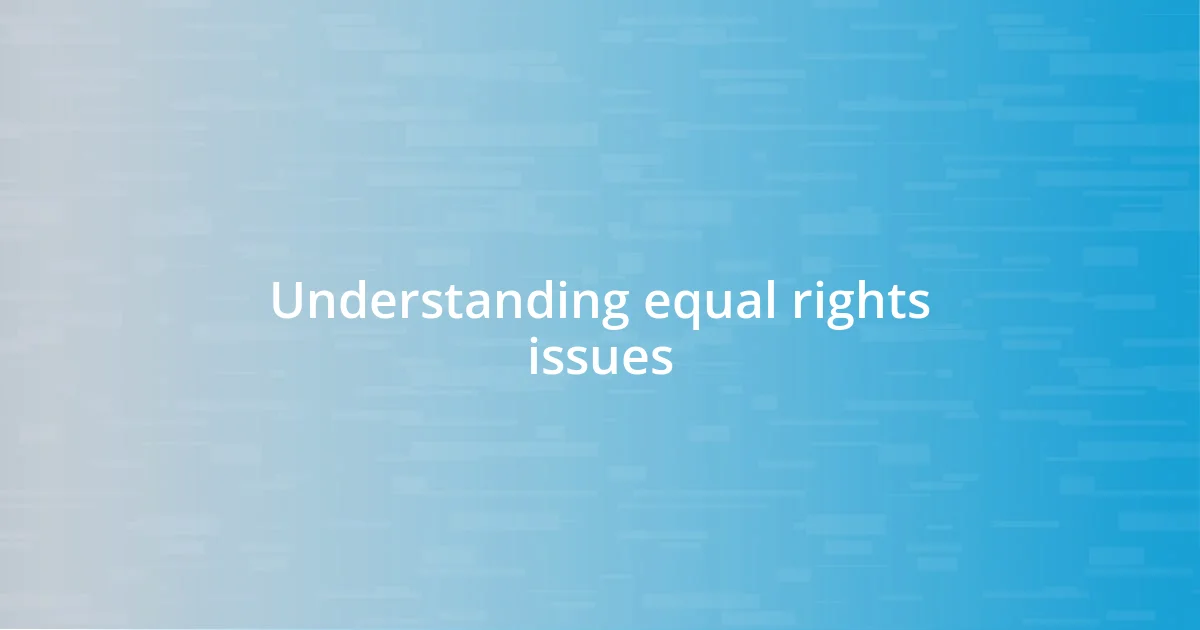
Understanding equal rights issues
Equal rights issues are often rooted in systemic injustices that can be hard to see unless you’ve experienced them firsthand. I remember attending a community meeting where someone bravely shared their story about facing discrimination at work. Hearing the pain in their voice stirred something deep within me; it made me realize that these challenges don’t just affect individuals, they ripple through families and communities.
Have you ever felt like your voice didn’t matter? That’s the reality for many when we talk about equal rights. It’s astonishing how insidious inequality can be, lurking in policies and practices we often take for granted. For instance, I once witnessed a colleague being overlooked for a promotion despite their exceptional performance, simply because they didn’t fit the conventional mold. It was a pivotal moment that opened my eyes to the disparities that permeate our workplaces.
I think understanding equal rights issues requires not just empathy, but active engagement. It’s crucial to ask ourselves difficult questions: Who benefits from the current system? What can I do to challenge the status quo? I’ve found that striving for equality isn’t just about advocating for others; it’s also about confronting my own biases and using my privilege to uplift those who don’t share the same advantages. By doing so, I feel a deep sense of responsibility but also a profound connection to the collective fight for justice.
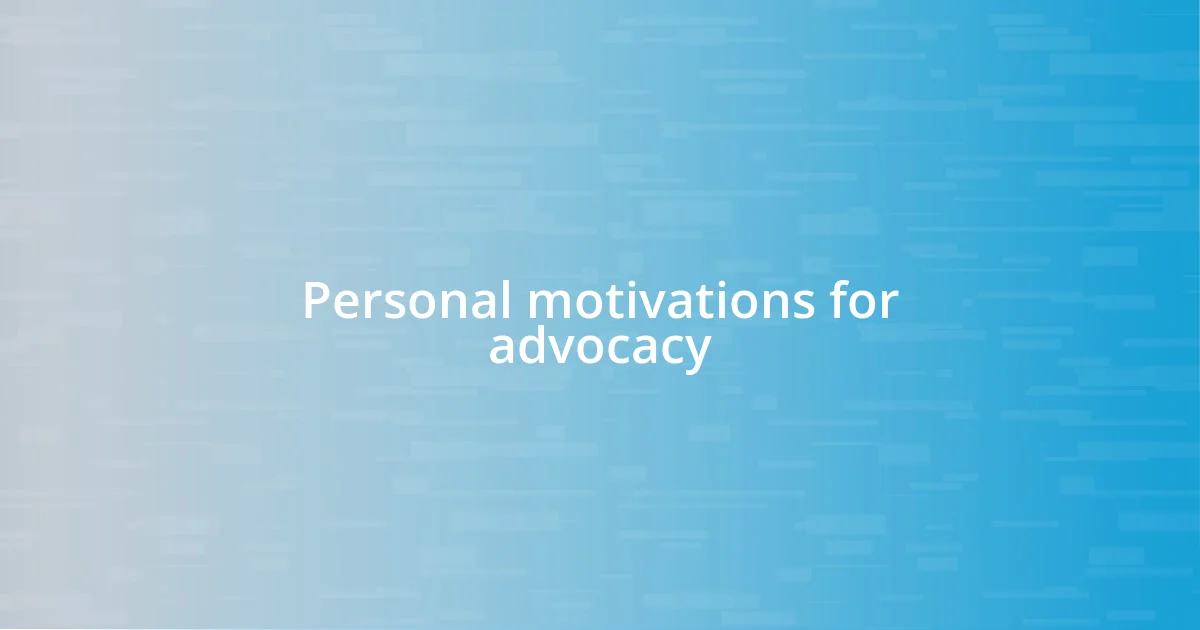
Personal motivations for advocacy
I’ve always had a passion for social justice, spurred by experiences from my childhood. I grew up in a diverse neighborhood where I witnessed firsthand the struggles of my friends and neighbors who faced discrimination. It made me realize that fighting for equal rights isn’t just a political stance; it’s a deeply personal commitment rooted in empathy and shared experiences. I often think back to those moments and how they fuel my desire to be an advocate for those who feel marginalized.
What drives me to advocate for equal rights is the belief that everyone deserves to be heard and valued. I recall an experience at a local rally where I met a woman who had faced obstacles in accessing healthcare. Listening to her story, I felt a surge of determination rise within me. It’s empowering to connect with others, share our stories, and work together to dismantle barriers. This connection is what motivates me to keep fighting for equality and to amplify voices that too often go unheard.
Also, I see advocacy as a way to inspire change and hope. I remember volunteering with a youth group where we created an awareness campaign on equal rights. Witnessing the passion in the eyes of those young people reinforced my belief that the next generation can champion equality if we empower them. It’s rewarding to see that ripple effect where advocacy leads to empowerment, fostering a more inclusive society.
| Motivation | Personal Experience |
|---|---|
| Childhood Experiences | Growing up in a diverse neighborhood opened my eyes to the struggles of others. |
| Connection with Others | Meeting individuals who have faced discrimination has strengthened my resolve to advocate for change. |
| Empowerment of Youth | Volunteering with young people showed me the potential for future leaders in the fight for equality. |
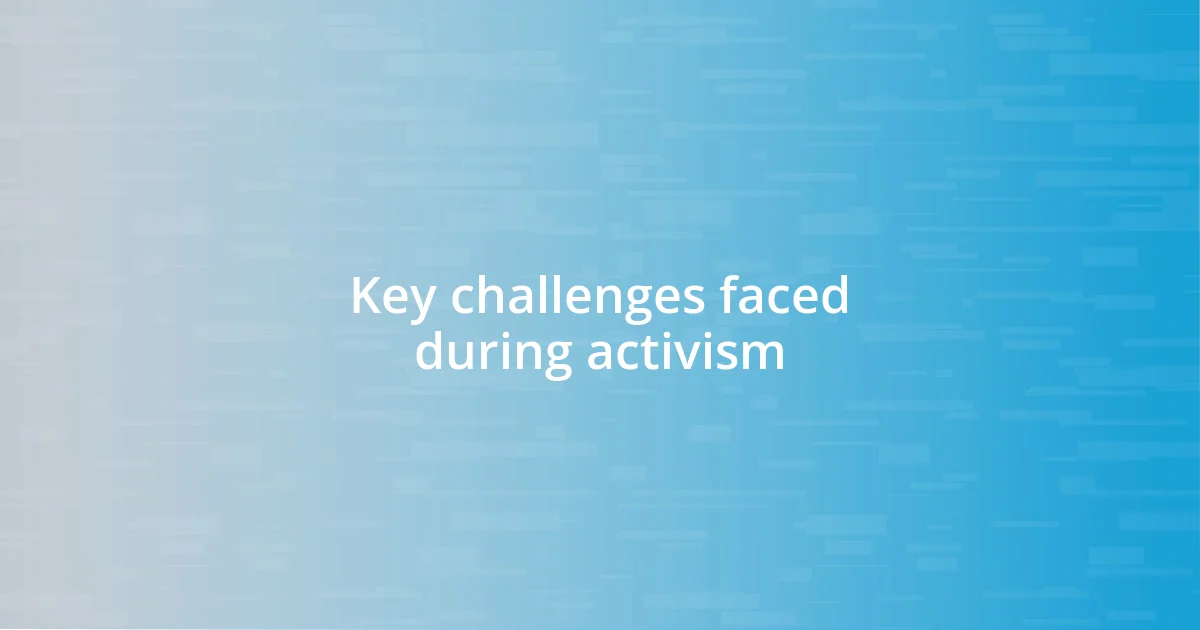
Key challenges faced during activism
Activism is a noble endeavor, but it doesn’t come without its share of hurdles. One significant challenge I faced was navigating internal divisions within the activist community itself. During one particular event, I noticed opposing factions arguing over the best approach to achieve our shared goals. The tension was palpable, and instead of moving forward together, we wasted valuable time squabbling. It’s disheartening when your own allies become a source of frustration, highlighting how essential, yet tricky, unity can be in the fight for equal rights.
The challenges of activism extend beyond our immediate circles. I recall a time when I stood in front of a local council to speak about a new policy that would disproportionately affect marginalized communities. My heart raced as I faced an audience filled with skeptics. The fear of backlash loomed over me, but I knew the stakes were too high to remain silent. I realized that speaking out often invites criticism, but I was determined to raise my voice for those who couldn’t. Here are a few challenges I’ve encountered:
- Internal Conflicts: Differences in methods and priorities among allies can create rifts that distract from the main cause.
- Fear of Retaliation: The anxiety of speaking out can silence even the most passionate advocates, especially in environments that are hostile to change.
- Burnout: The emotional toll of constant activism can lead to exhaustion, making it essential to find balance and practice self-care.
Engaging in activism requires resilience in the face of both external and internal pressures, and I’ve learned that our collective strength often lies in how we support one another through these challenges.
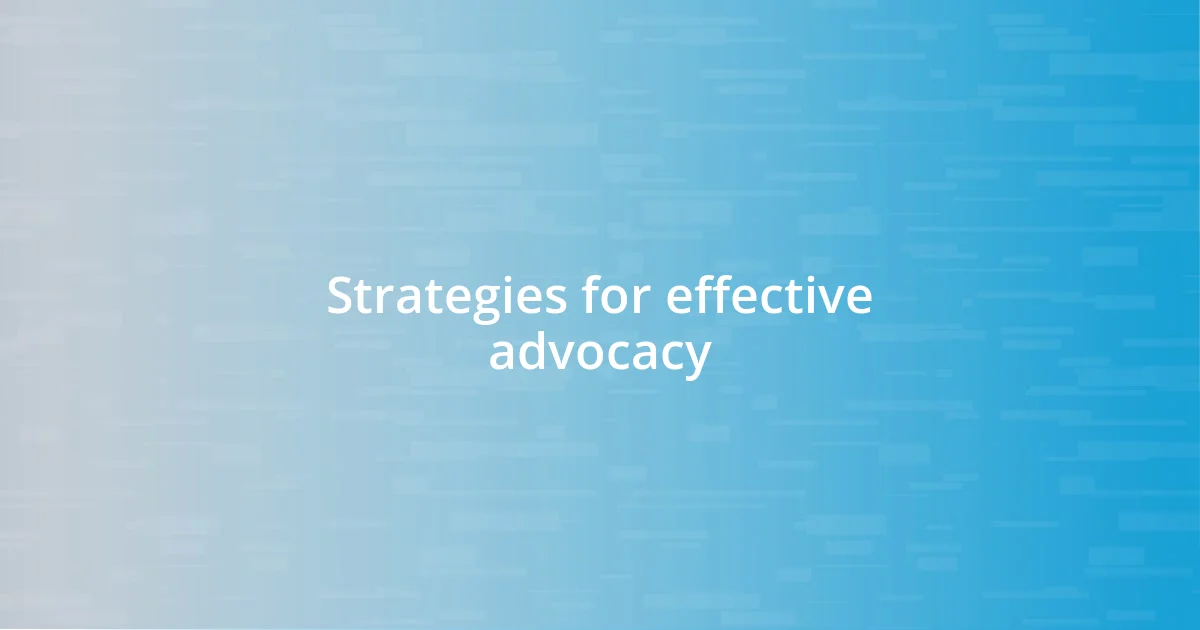
Strategies for effective advocacy
Effective advocacy requires a blend of strategies that align with both personal values and community needs. One approach I’ve found particularly impactful is storytelling. When I shared my own experience about discrimination during a community meeting, the connection was immediate. People resonated with my narrative, sparking conversations that highlighted others’ stories. It’s fascinating how vulnerability can create a bridge between individuals, making complex issues feel more relatable.
Another strategy is building coalitions. I once collaborated with various organizations to push for a local initiative aimed at increasing access to public services. By pooling our resources and areas of expertise, not only did we amplify our voices but we also demonstrated the importance of unity. In my experience, recognizing the strength in diversity enhances our advocacy efforts. It’s a reminder that we’re not alone in this journey; we’re part of a larger movement.
Additionally, consistent follow-up is crucial. I remember attending a rally and hearing promises from policymakers that fizzled out over time. I took it upon myself to reach out regularly, keeping the conversation alive. It made me think—how often do we let initiatives slip through the cracks after a passionate event? Persistence can be our greatest ally in advocacy. It’s about nurturing those connections and ensuring our issues remain in the spotlight, pushing for accountability every step of the way.
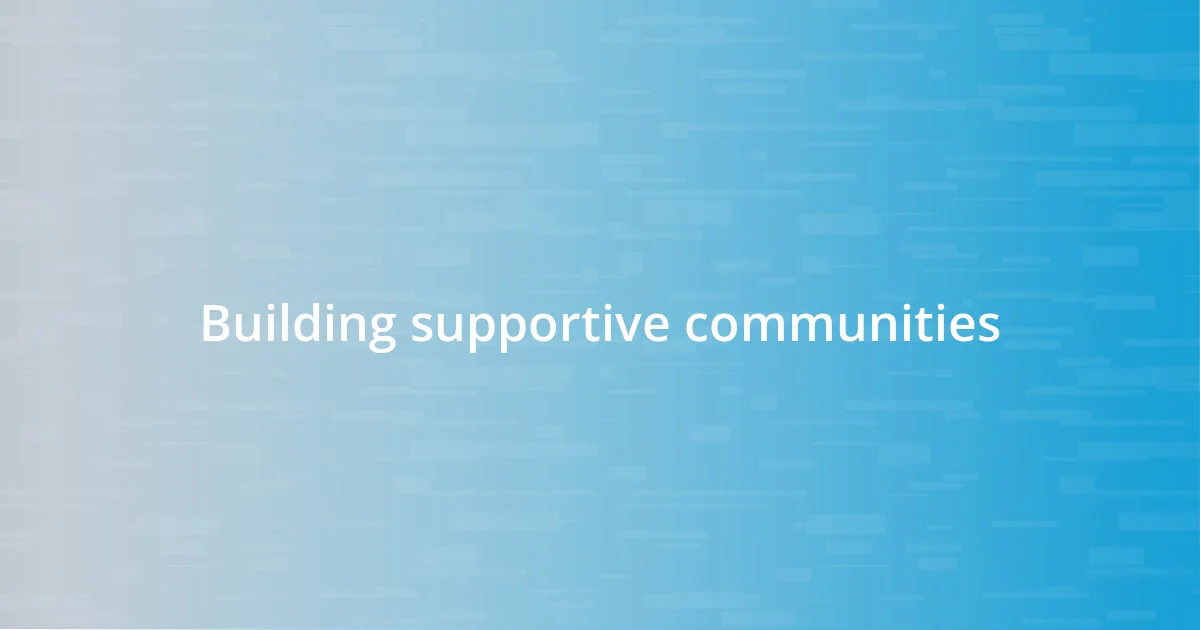
Building supportive communities
Building supportive communities is vital in the pursuit of equal rights. I remember a time when I attended a local support group that gathered individuals from diverse backgrounds facing similar struggles. The warmth in that room was palpable; it felt like a safe haven where we could express our feelings freely without fear of judgment. Isn’t it amazing how solidarity can foster a sense of belonging? I believe that when people come together to share their vulnerabilities, they create a powerful network of support that propels us all forward.
In my experience, creating these supportive spaces isn’t just about gathering individuals; it’s about cultivating trust and mutual respect. I recall initiating a monthly discussion group focused on equality issues, where we encouraged active participation. The first meeting was a bit awkward, but as we shared our stories, laughter mixed with tears, and by the third session, we were practically family. I’ve learned that laying that foundation of trust invites deeper conversations and encourages everyone to engage more openly. Have you ever experienced that kind of connection? It’s transformative.
Moreover, it’s essential to weave inclusivity into the fabric of our communities. One memorable initiative involved partnering with local artists to organize a community mural project. Participants from all walks of life came together, sharing their artistic visions while celebrating our diverse narratives. Watching everyone showcase their unique perspectives, I realized that art not only beautifies a space but also symbolizes our collective struggle for equality. Building supportive communities is about amplifying each voice, embracing our differences, and ensuring that everyone feels valued. Have you found ways to lift up the voices of others in your community? I wholeheartedly believe that when we do so, we ignite change.
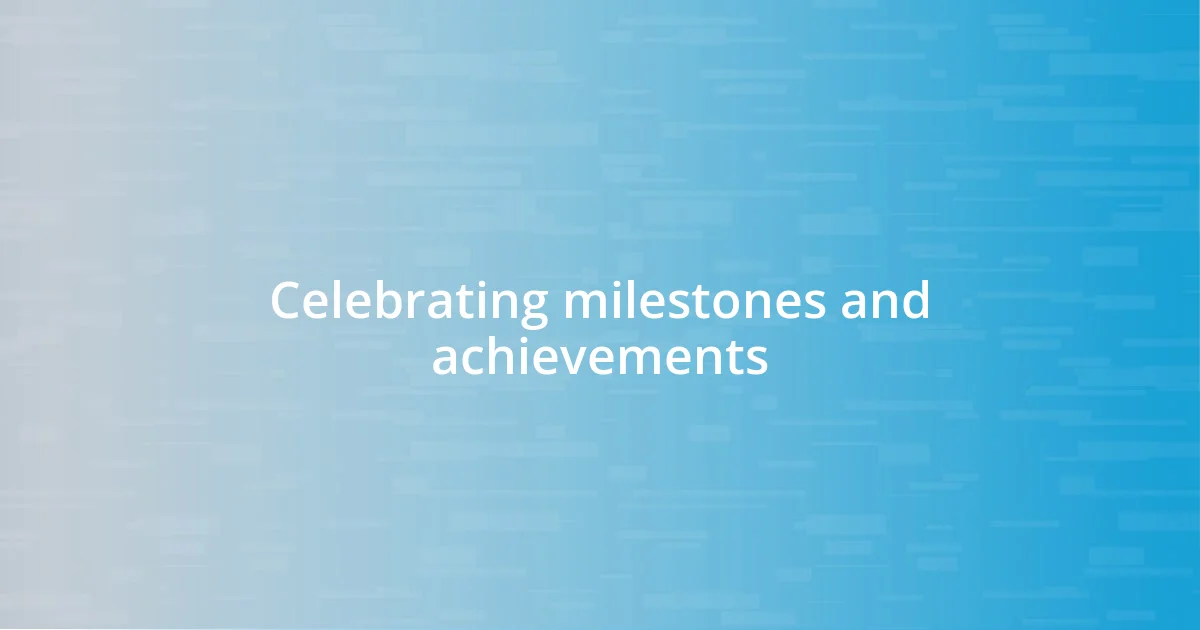
Celebrating milestones and achievements
Celebrating milestones in the fight for equal rights feels like a breath of fresh air. I’ll never forget the exhilaration I felt when a law I had advocated for finally passed. Gathering with my fellow activists to celebrate that achievement was magical; we were not just celebrating a legislative victory but acknowledging all the late nights and hard work that led us there. Can you recall a moment when your efforts paid off, no matter how small? Those milestones reinforce our commitment and remind us that change is possible.
Another significant achievement was the launch of an education campaign in my community. I remember the pride swelling in my chest as I watched families come together for our first event. It was a celebration of knowledge and empowerment, which brought an emotional connection like no other. As I saw the smiles of children holding up their “equal rights matter” signs, I thought, “This is why we fight.” It showed me that our collective actions could educate and inspire future generations.
Moreover, I find joy in recognizing the personal achievements of individuals within our movement. A friend of mine delivered a powerful speech at a conference after years of feeling silenced. Witnessing her confidence grow was a milestone not just for her but for all of us. Have you ever supported someone in realizing their potential? I believe that when we lift each other up, we celebrate not just individual victories but the strength of our entire community. Celebrating these achievements reminds us of the importance of our journey together toward equality.
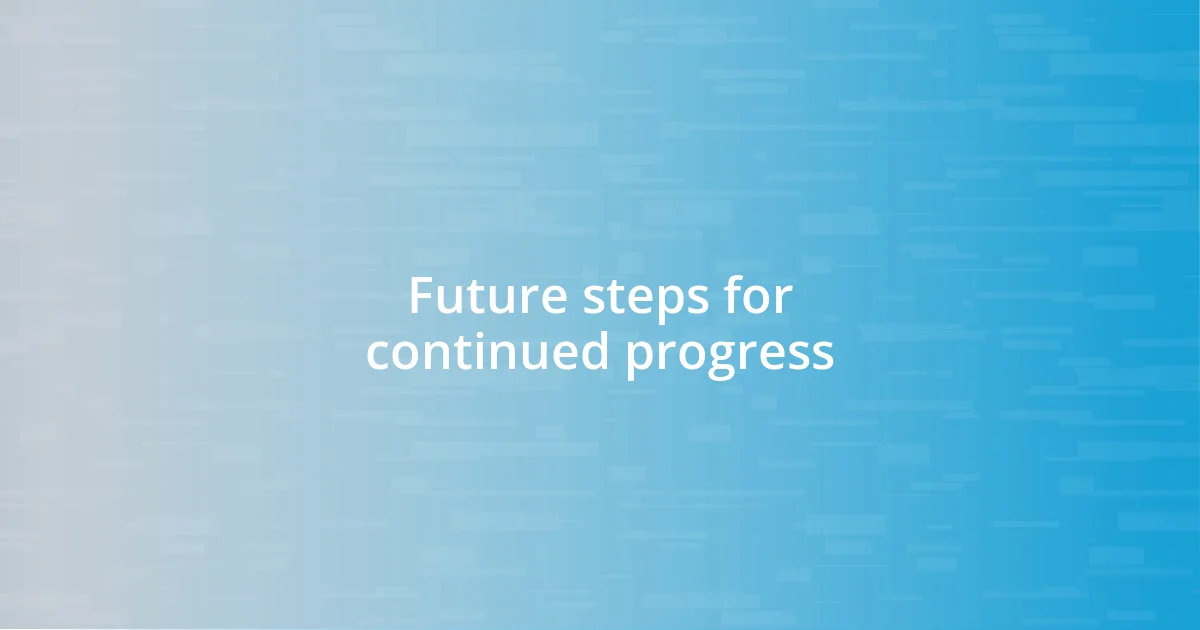
Future steps for continued progress
As I look to the future, I see education as a vital tool in the fight for equality. I was fortunate enough to take part in a workshop focused on teaching young people about their rights. Watching those bright faces light up with newfound knowledge was a powerful reminder of how education can spark change. Have you ever witnessed a moment when understanding transformed someone’s perspective? I truly believe that informed individuals are more likely to advocate for themselves and others.
Advocacy also requires us to engage with policymakers consistently. I recall attending town hall meetings where I spoke passionately about issues affecting our community. Even though I felt nervous standing in front of everyone, that moment of vulnerability was essential. It urged me to realize that our voices must be heard in those crucial spaces. What happens when we let fear hold us back? Change stagnates. By actively participating in local governance, we can hold decision-makers accountable and ensure our needs are represented.
Lastly, fostering intergenerational connections is a promising step forward. I remember volunteering at a senior center, where I listened to stories from elders who fought for rights long before me. Their insights were invaluable; they navigated immense challenges that shaped the world I live in. Have you ever connected with someone from a different generation? It’s an eye-opening experience. Bringing together different age groups can create a rich tapestry of experiences and perspectives, reminding us all that the fight for equality spans generations. As we move forward, leveraging those connections can strengthen our resolve and drive progress.







